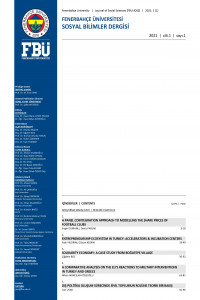Abstract
Bu araştırmanın temel amacı, Türkiye'deki girişimcilik ekosistemini incelemek ve yenilikçi girişimciliği
geliştirmek için ihtiyaç duyulan eğitimler konusunda önerilerde bulunmaktır.
Araştırma yöntemi, 13 girişimci ile derinlemesine görüşmelerin yapıldığı nitel analize dayanmaktadır.
Girişimcilere demografik yapıları, sosyo-kültürel deneyimleri ve start-up'ları hakkında toplam 7 soru
sorulmuştur.
Çalışma sonucunda yenilikçi girişimciliği artırmak için ihtiyaç duyulan girişimcilik eğitimine ilişkin bir
değerlendirme yapılmıştır. En zorlanılan aşamalar; ağ oluşturma, müşteri bulma, ürün / hizmet sunma,
ürünü test etme ve ekip oluşturmadır. Girişimcilik merkezlerinin, start-up’ların hayatta kalma oranını
artırmak için onların ihtiyaçlarına odaklanarak destek sağlaması gerekir. Merkezler Türkiye'de 3 ilde yoğunlaşmıştır. Tüm illerdeki her gencin girişimci olma potansiyeline sahip olduğu düşünüldüğünde, bu
merkezlerde uzaktan eğitim verilmesi faydalı olacaktır.
Girişimcilik, gelişmekte olan ülkelerde ekonomik kalkınma için önemli bir faktördür. Rekabet avantajı
elde etmek için girişimcilik inovasyonla paralel ilerlemelidir. Bu nedenle ülke geneline yayılmış
girişimcilik merkezlerinin inovasyon yaratacak start-up'ların zorlandığı alanları hedefleyerek destek
sağlaması önemlidir. Bu çalışmada, Türkiye'deki girişimcilerin ihtiyaçlarını derinlemesine anlayarak
hızlandırıcı ve kuluçka merkezlerinin desteklerini zenginleştirmeyi amaçlamaktadır.
References
- Aldrich, H. E. (1993). From Traits to Rates: An Ecological Perspective on Organizational Foundings. Jerome Katz and Robert Brockhaus (Eds.), 1, 145-195.
- Arı, A. (2019). Effect of Incubation Centers on The Development of National Innovation And Entrepreneurship System. Published Thesis. Dokuz Eylül University .
- Ayar, U. (2019). The Effect of Entrepreneurship Education on Entrepreneurship Intention and A Research. Published Thesis.
- Börü, D. (2006). Entrepreneurship Tendency: Research on Business Administration Students. Publications of Unstitute of Social Sciences.
- Chandra, Y. S. (2012). An Opportunity-Based View of Rapid Internationalization. Journal of International Marketin, 20(1), 74-102. doi:10.2307/23274418
- Chesbrough, W. H. (2008). Open Innovation: Researching A New Paradigm. Harvard Business School Publishing Corporation.
- Churcill. (1992). ’Research Issues in Entrepreneurship’’ In The State of The Art of Entrepreneurship, edited by Donald L. Sexton and John D. Kasarda. Boston. PWS - Kent Publishing Co.
- Draheim, K. P. (1972). Factors Influencing the Rate of Formation of Technical Companies. Technical Entrepreneurship.
- Drucker, P. F. (1993). Innovation and Entrepreneurship (2002 b.). PerfectBound™ .
- European Comission. (2013). Entrepreneurship, 2020 Action Plan. https://eurlex.europa.eu/LexUriServ/LexUriServ.do?uri=COM:2012:0795:FIN:EN:PDF
- Fritsch, M. A. (2013). Regional Public Research, Higher Education, And Innovative Start-Ups: An Empirical Investigation. Small Business Economics, 865-885.
- Gartner, W. B. (1989). who is an entrepreneur? Is the wrong question, Entrepreneurship Theory and Practice. University of Baltimore Educational Foundation.
Abstract
The main aim of this research is to examine the entrepreneurship ecosystem in Turkey and to make
recommendations about needed training to develop innovative entrepreneurship.
The research method is based on qualitative analysis which in-depth interviews were made with 13
entrepreneurs. Entrepreneurs were asked a total of 7 questions about their demographic structure,
socio-cultural experiences, and start-ups.
As a result of the study, an evaluation was made about the entrepreneurship training needed to increase
innovative entrepreneurship. The most challenging stages are networking, finding customer, introducing
product/service, testing product, and creating a team. The centers need to provide support focused on
entrepreneurial needs to increase the start-up survival rate. The centers are concentrated in 3 provinces
in Turkey. Considering each young people in all provinces has the potential for being an entrepreneur,
it will be beneficial to provide remote education in these centers.
Entrepreneurship is an important factor for economic development in developing countries.
Entrepreneurship should proceed parallel with innovation to a gain competitive advantage. For this
reason, it is important that entrepreneurship centers spread across country provide support by targeting
the areas where start-ups that will create innovation have difficulty. This paper aims to enriche the
supports of accelerator and incubation centers by presenting in depth-understanding the needs of
entrepreneurs in Turkey.
References
- Aldrich, H. E. (1993). From Traits to Rates: An Ecological Perspective on Organizational Foundings. Jerome Katz and Robert Brockhaus (Eds.), 1, 145-195.
- Arı, A. (2019). Effect of Incubation Centers on The Development of National Innovation And Entrepreneurship System. Published Thesis. Dokuz Eylül University .
- Ayar, U. (2019). The Effect of Entrepreneurship Education on Entrepreneurship Intention and A Research. Published Thesis.
- Börü, D. (2006). Entrepreneurship Tendency: Research on Business Administration Students. Publications of Unstitute of Social Sciences.
- Chandra, Y. S. (2012). An Opportunity-Based View of Rapid Internationalization. Journal of International Marketin, 20(1), 74-102. doi:10.2307/23274418
- Chesbrough, W. H. (2008). Open Innovation: Researching A New Paradigm. Harvard Business School Publishing Corporation.
- Churcill. (1992). ’Research Issues in Entrepreneurship’’ In The State of The Art of Entrepreneurship, edited by Donald L. Sexton and John D. Kasarda. Boston. PWS - Kent Publishing Co.
- Draheim, K. P. (1972). Factors Influencing the Rate of Formation of Technical Companies. Technical Entrepreneurship.
- Drucker, P. F. (1993). Innovation and Entrepreneurship (2002 b.). PerfectBound™ .
- European Comission. (2013). Entrepreneurship, 2020 Action Plan. https://eurlex.europa.eu/LexUriServ/LexUriServ.do?uri=COM:2012:0795:FIN:EN:PDF
- Fritsch, M. A. (2013). Regional Public Research, Higher Education, And Innovative Start-Ups: An Empirical Investigation. Small Business Economics, 865-885.
- Gartner, W. B. (1989). who is an entrepreneur? Is the wrong question, Entrepreneurship Theory and Practice. University of Baltimore Educational Foundation.
Details
| Primary Language | English |
|---|---|
| Journal Section | Research Articles |
| Authors | |
| Publication Date | June 30, 2021 |
| Published in Issue | Year 2021 Volume: 1 Issue: 1 |


